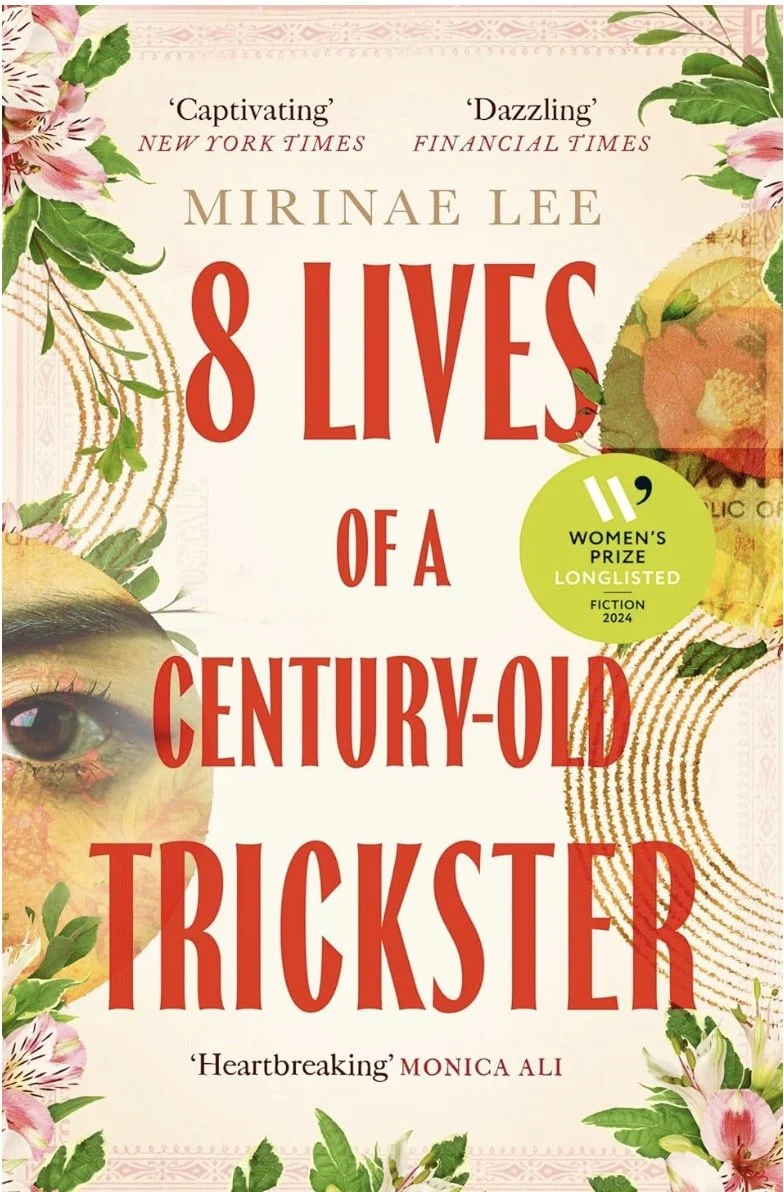8 Lives of a Century-Old Trickster
by Mirinae Lee
A brutal, layered story of survival, identity, and what it costs to make it out alive.
Looking for a spoiler-free review of 8 Lives of a Century-Old Trickster?
Here’s what it’s about, what haunted me most, and why I think this is one of the most powerful Korean novels I’ve read in a long time.
What It’s About
It’s not easy to summarize this one. Not because it’s complicated but because it refuses to fit neatly into any one shape. That’s part of what makes it so powerful.
At the center is Mook, a woman nearly 100 years old, living in a South Korean senior home. She’s being interviewed by an obituary writer. But instead of offering a single life story, she gives eight. Eight identities. Eight fragments. Some real, some maybe not. She’s been a comfort woman, a spy, a murderer, a mother, a prisoner, a fugitive, and above all, a survivor.
The book doesn’t move in a straight line, it skips across time and space. It doesn’t try to connect the dots for you. Names change. Context shifts. Sometimes the truth gets bent. But underneath the trickery is something very real: the history of a country and the toll that history took on the bodies of its women.
This isn’t just the story of one woman. It’s the story of Korea itself, told through the scars of someone who lived its ugliest chapters and kept going.
My Take
I really loved this book. It wrecked me in places, but in the way I want a book like this to wreck me.
There’s one scene I keep circling back to and it’s not loud or graphic, but it gutted me.
One woman dies. Another steps into her life. And when someone from that past arrives, there’s this moment of almost-recognition, a moment that holds grief, memory, and quiet mercy all at once.
No one asks the question. No one tells the truth out loud. But it’s understood. And that’s what broke me. That someone could go through all of that and not be questioned, not pushed to explain, but just… allowed to keep going. That’s what stayed with me.
That’s the kind of book this is. It shows you how brutal survival can be. And how, sometimes, survival requires taking on a name that isn’t yours, a life that wasn’t meant for you and literally wear someone else’s shoes, just to make it to the other side.
There’s a long, dark stretch of history behind this story, and not just personal trauma, but national. The Japanese occupation. The exploitation of women. The trauma of division. The American influence. The betrayals by faith, by state, by family. So many forces brutalized Korean women across the 20th century and this novel doesn’t flinch from any of it.
Mook is one of the most complex women I’ve read in a long time. I didn’t always trust her. I didn’t always like her. But I believed her. She’s hard. She’s messy. She lies. She hides. She adapts. She survives. And that, in this book, is a kind of victory.
Would I Recommend It?
Yes, if you’re ready to sit with something heavy.
This is not a gentle story. It’s violent. It’s fragmented. It offers no clean resolution. But it is necessary.
If you’ve read One Left by Kim Soom, this feels like the louder, angrier cousin. Human Acts came to mind too, in the way both books deal with state violence and collective forgetting. And We Do Not Part, which approaches the trauma of the Jeju Uprising in a more surreal way, also feels like it belongs in conversation with this one. Even White Mulberry, also inspired by the author’s grandmother’s life, echoes some of the same grief and fragmentation passed between generations.
So yes. I recommend it. If you’re ready.
This post contains affiliate links. If you purchase through these links, I may earn a commission at no additional cost to you.
Where to Find It
Buy on Amazon
Buy on Bookshop.org
First time on Bookshop.org? Click for discount code
Also available via WorldCat if you want to check your local library
Related Reads
If this book moved you, you might also want to read:
One Left by Kim Soom — A quiet, devastating novel about Korea’s comfort women and the silence they carried.
Human Acts by Han Kang — A lyrical but brutal reckoning with state violence, memory, and collective mourning.
White Mulberry by Rosa Kwon Easton — A memoir about diaspora, grief, and the long reach of generational trauma.
We Do Not Part by Han Kang — A surreal and layered novel about friendship, silence, and the aftermath of the Jeju Uprising.
Looking for your next read?
My Asian Era is where literature meets culture — thoughtful reviews, quiet voices, and stories worth slowing down for.

